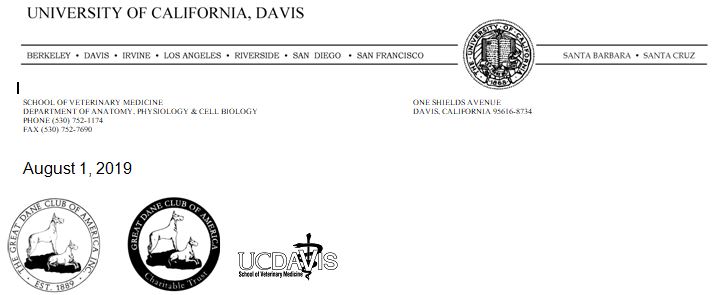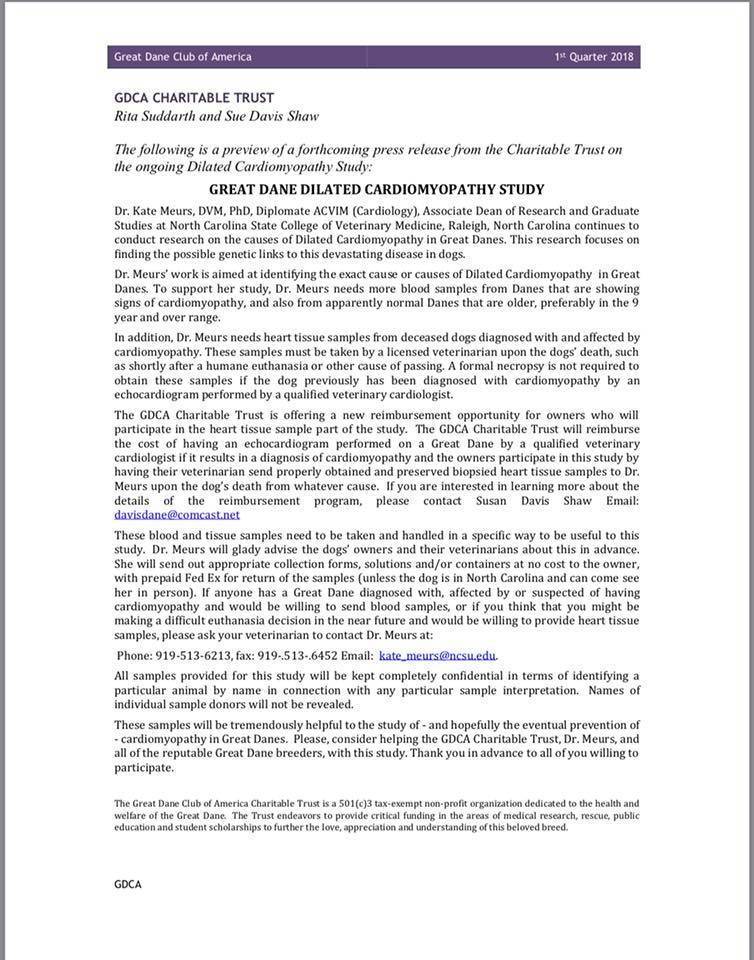CURRENT RESEARCH PROJECTS
Courtesy Posting - ELIAS Animal Health – Clinical Trial Information (Dec 2024)
ELIAS Animal Health – Clinical Trial Information
For your website or e-newsletter
Canine Osteosarcoma Clinical Trial
ELIAS Animal Health is currently conducting a clinical trial for large-breed dogs newly diagnosed with appendicular osteosarcoma (bone cancer in a limb). This study will assess safety and effectiveness of ELIAS’s vaccine-enhanced adoptive T cell therapy combined with a novel adjuvant as a limb-sparing treatment. The study will be conducted at the University of Missouri-Columbia.
Key Details
- Treatment includes limb-sparing surgery to remove primary tumor, followed by vaccine-enhanced adoptive T cell therapy combined with a novel adjuvant.
- Eligible patients must be newly diagnosed with appendicular osteosarcoma and must not have received prior treatment for the cancer; patients must not have metastatic disease at the time of diagnosis.
- Patients must complete the 7-11 week protocol, conducted at the University of Missouri-Columbia, and return for periodic follow-up visits during the 12-month observation period.
Learn more about the study and see if your dog is eligible on the ELIAS website.
For your social media pages
ELIAS Animal Health is conducting a clinical trial for large-breed dogs diagnosed with osteosarcoma. The study will assess safety and effectiveness of ELIAS’s vaccine-enhanced adoptive T cell therapy combined with a novel adjuvant as a limb-sparing treatment. The study will be conducted at the University of Missouri-Columbia. Learn more about the study and find out if your dog may be eligible on the ELIAS website.
Link: https://eliasanimalhealth.com/clinical-trials/canine-osteosarcoma-limb-sparing/
GDCA Irish Spotting Gene Research (2024)
This study was funded totally by the Great Dane Club of America and is listed here (click link below) with their consent and for easy access.
Post Operative Bleeding Study (2024)
Click here to see Powerpoint
Early Detection of Canine Osteosarcoma (2021)
To fund (with several other breed clubs) a study done by Dr. Jaime Modiano at the University of Minnesota to research the early diagnosis of osteosarcoma
Click here to see the 2025 RESEARCH PROGRESS REPORT SUMMARY
Click here to see the 2024 RESEARCH PROGRESS REPORT SUMMARY
Click here to see the 2023 RESEARCH PROGRESS REPORT SUMMARY
Cancer Infusion Therapy Research
The Great Dane Club of America Charitable Trust has donated $25,000 to research a new cancer infusion therapy for the treatment of Osteosarcoma in dogs. Based on our support the research group has committed to using great danes in one of their trials. This therapy could cross over into use in humans if it is successful in dogs. Please consider participating in this trial if you have a Great Dane who meets the guidelines. If you have any questions please feel free to contact Gary Nice at the email listed below, any Trustee or Dr. Neil O’Sullivan at drneil@minburncomm.net.
New Canine Infusion Therapy Trial is looking for Great Danes with Metastatic & Non-Metastatic Osteosarcoma. Trial is being conducted in Longview, TX (128 miles east of Dallas TX). Treatments will be twice a week either Monday and Wednesday or Tuesday and Thursday for four weeks and can start very quickly. Best candidates should be within driving distance of Longview, TX. For further information, please contact Gary Nice at garynice@caninecancercenters.com. In order for a candidate to enter the trial, we must have all documents verifying a diagnosis of the cancer including x-rays and pathology report. Complete health records also will need to be supplied.
PAST RESEARCH PROJECTS
North Carolina Osteosarcoma Study (2021)
Participated in the North Carolina Osteosarcoma Study by matching the GDCA’s monetary donation of $300 in gift cards and partnering with them in publicizing the study to affiliate clubs to publish in their bulletins.
Identification of Genetic Risk Factors Contributing to Gastrointestinal Motility Disorders of Great Danes
Co-funded with the Canine Health Foundation – Dr. Leigh Ann Clark’s research proposal on “Identification of Genetic Risk Factors Contributing to Gastrointestinal Motility Disorders of Great Danes”
Click here for report update
Fertility Study in Great Danes (2018)
Your Trust has recently voted to financially support a two-year Theriogenology (reproductive health) research project to determine the factors that result in optimal sperm production and function in male Great Danes of varying ages. Dr. Stuart Meyers of University of California, Davis, along with his graduate students and assistants, will be working to develop new methods to assess male fertility and to develop new semen additives and methods to cryopreserve dog semen. The expansion of the use of artificial insemination in breeding of pure-bred and purpose-bred dogs has necessitated a new understanding of fundamental metabolic processes by which sperm function can be optimized for storage and for maintaining stud dog fertility. This project will specifically benefit Great Danes as our breed has been under-represented in the limited studies done on sperm function to date. Findings in this study will very likely apply to many other dog breeds, hence, the AKC Canine Health Foundation will be watching and looking into collaborating at a later date as Theriogeneology (Canine Reproductive Health) is one of the objectives of the CHF in 2019. The knowledge obtained from this study will be essential to reproductive management and understanding the complex nature of male fertility, benefiting our dogs today as well as in years to come. More information to follow about how you, too, can participate in this endeavor!!!

Great Dane Semen Quality and Fertility Research Study
We are grateful for the Great Dane Club of America and the Great Dane Charitable Trust support of our research program in male fertility at UC Davis!
In recent years, the use of artificial insemination (AI) and frozen semen for dog breeding has been expanding in veterinary clinical practice and these techniques are highly desired for genetic improvement of elite breeding stock. In our previous work on canine semen quality, we used advanced measures of semen analysis including laser flow cytometry and computer-assisted sperm motility analysis (CASA) to determine that aging Labrador retriever males showed elevated reactive oxygen species (ROS) that was associated with declines in sperm motility.
In this newly funded research, we will utilize new technology that measures oxygen usage as well as traditional measures of sperm fertility. This method has never been used in canine sperm and we expect to determine the best conditions for dog sperm to efficiently produce energy. In this way, we will determine if ATP production and sperm motility can be generated without excessive oxygen free radical formation. Our results will be used to determine if aging and cryopreservation methods for Great Danes will have detrimental effects on sperm quality and will provide a mechanism for us to understand how to optimize sperm production of ATP and motility.
We are very excited to be attending the 2019 GDCA National Specialty for the purposes of collecting semen for this study. We plan to collect from 20-25 males (each day) over a three day period, 10/9, 10/10 and 10/11. Please visit the GDCA Northeast Division Store for details on signing up. There is no charge for this clinic. The only requirement is signing a consent form to participate.
My lab at UC Davis welcomes your participation and we look very forward to helping to understand male-based fertility problems in Great Danes.
Sincerely,

Stuart A. Meyers, DVM, PhD, American College of Theriogenologists
Professor
Dr Meyers Research - Mitochondrial Disruption - Sperm Motility (2018)
Funded (with the GDCA) the fertility study at UC Davis under the direction of Dr. Stuart Meyers for a two-year duration
View PDF
Cardio Press Release (2018)
